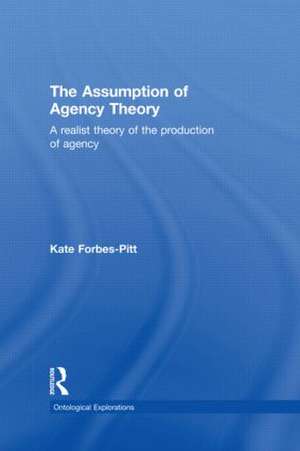The Assumption of Agency Theory: Ontological Explorations (Routledge Critical Realism)
Autor Kate Forbes-Pitten Limba Engleză Paperback – 19 mai 2014
Building upon existing theories of philosophy of mind, this book shows not how humans operate theoretically, but how they use every day human skill to overcome knowledge barriers and understand each other through knowing themselves. Only once human interaction has been theorized in this way are machines able to be placed within it; when it is easier to understand what humans believe them to be. This book characterizes a non-human agent that shows itself in interaction but is distinct from human agency: an agent acting with us in our ongoing reproduction and transformation of structure. Turing predicted that at the end of the twentieth century, we would refer to thinking machines ‘without fear of contradiction’. The Assumption of Agency Theory shows how and why, even if we don’t say it, we deal with machines every day as if they are thinking, acting agents.
| Toate formatele și edițiile | Preț | Express |
|---|---|---|
| Paperback (1) | 461.86 lei 6-8 săpt. | |
| Taylor & Francis – 19 mai 2014 | 461.86 lei 6-8 săpt. | |
| Hardback (1) | 1054.10 lei 6-8 săpt. | |
| Taylor & Francis – apr 2011 | 1054.10 lei 6-8 săpt. |
Din seria Ontological Explorations (Routledge Critical Realism)
- 8%
 Preț: 425.29 lei
Preț: 425.29 lei -
 Preț: 340.38 lei
Preț: 340.38 lei -
 Preț: 326.49 lei
Preț: 326.49 lei -
 Preț: 295.64 lei
Preț: 295.64 lei -
 Preț: 379.07 lei
Preț: 379.07 lei - 28%
 Preț: 821.10 lei
Preț: 821.10 lei - 26%
 Preț: 817.51 lei
Preț: 817.51 lei -
 Preț: 488.33 lei
Preț: 488.33 lei -
 Preț: 480.83 lei
Preț: 480.83 lei - 18%
 Preț: 1058.43 lei
Preț: 1058.43 lei - 30%
 Preț: 937.61 lei
Preț: 937.61 lei -
 Preț: 438.14 lei
Preț: 438.14 lei - 17%
 Preț: 270.20 lei
Preț: 270.20 lei -
 Preț: 413.33 lei
Preț: 413.33 lei - 18%
 Preț: 1117.07 lei
Preț: 1117.07 lei -
 Preț: 464.54 lei
Preț: 464.54 lei -
 Preț: 365.91 lei
Preț: 365.91 lei -
 Preț: 145.32 lei
Preț: 145.32 lei - 18%
 Preț: 1058.69 lei
Preț: 1058.69 lei - 43%
 Preț: 213.77 lei
Preț: 213.77 lei - 43%
 Preț: 189.44 lei
Preț: 189.44 lei - 23%
 Preț: 339.31 lei
Preț: 339.31 lei -
 Preț: 446.53 lei
Preț: 446.53 lei - 15%
 Preț: 425.26 lei
Preț: 425.26 lei -
 Preț: 413.76 lei
Preț: 413.76 lei - 18%
 Preț: 1225.29 lei
Preț: 1225.29 lei - 29%
 Preț: 273.65 lei
Preț: 273.65 lei - 18%
 Preț: 1054.89 lei
Preț: 1054.89 lei - 28%
 Preț: 819.32 lei
Preț: 819.32 lei -
 Preț: 480.24 lei
Preț: 480.24 lei - 18%
 Preț: 1108.73 lei
Preț: 1108.73 lei - 25%
 Preț: 823.08 lei
Preț: 823.08 lei - 25%
 Preț: 854.14 lei
Preț: 854.14 lei - 31%
 Preț: 331.35 lei
Preț: 331.35 lei
Preț: 461.86 lei
Nou
Puncte Express: 693
Preț estimativ în valută:
88.39€ • 91.94$ • 72.97£
88.39€ • 91.94$ • 72.97£
Carte tipărită la comandă
Livrare economică 14-28 aprilie
Preluare comenzi: 021 569.72.76
Specificații
ISBN-13: 9781138797970
ISBN-10: 1138797979
Pagini: 182
Ilustrații: illustrations
Dimensiuni: 156 x 234 x 13 mm
Greutate: 0.28 kg
Ediția:1
Editura: Taylor & Francis
Colecția Routledge
Seria Ontological Explorations (Routledge Critical Realism)
Locul publicării:Oxford, United Kingdom
ISBN-10: 1138797979
Pagini: 182
Ilustrații: illustrations
Dimensiuni: 156 x 234 x 13 mm
Greutate: 0.28 kg
Ediția:1
Editura: Taylor & Francis
Colecția Routledge
Seria Ontological Explorations (Routledge Critical Realism)
Locul publicării:Oxford, United Kingdom
Cuprins
Introduction Chapter 1: Philosophical Assumptions Section 1: Self-knowledge and the Assumption of Agency Chapter 2: Problem of Other Minds: the importance of first-order concepts Chapter 3: What it Means to be Minded: intentionality Chapter 4: Reasons and Causes Chapter 5: Preliminary Statements About Agency Section 2: Interaction, Maintenance of Agency and the Unexplained Act Chapter 6: The Ego Agent and Structure Chapter 7: Maintenance of Agency: first order concepts through interaction Chapter 8: Satisfying the Conditions of Agency: using the action-mind chain Chapter 9: The Unexplained Act: arriving at the evinced agent Section 3: Technology as Agent Chapter 10: Technology as Evinced Agent: disappearing the machine Chapter 11: Disappearing the Machine into the Ego Agent: 3D interaction and its implications for agency and reality Conclusion
Recenzii
'...succeeds in producing a firm argument that leads towards a step that is long overdue: to incorporate the presence of intelligent, ‘behaving’ machines directly into theories of the social (and human) sciences.'
-Kathrine Elizabeth Anker in the Journal of Critical Realism, vol 11 no 4
-Kathrine Elizabeth Anker in the Journal of Critical Realism, vol 11 no 4
Descriere
The Assumption of Agency Theory revisits the Turing Test and examines what Turing’s assessor knew. It asks important questions about how machines vis à vis humans have been characterized since Turing, and seeks to reverse the trend of looking closely at the machine by asking what humans know in interaction and how they know it. This book characterizes a non-human agent that shows itself in interaction but is distinct from human agency: an agent acting with us in our ongoing reproduction and transformation of structure. Turing predicted that at the end of the twentieth century, we would refer to thinking machines ‘without fear of contradiction’. The Assumption of Agency Theory shows how and why, even if we don’t say it, we deal with machines every day as if they are thinking, acting agents.

















